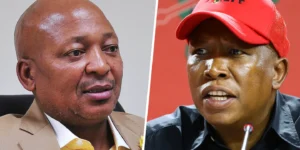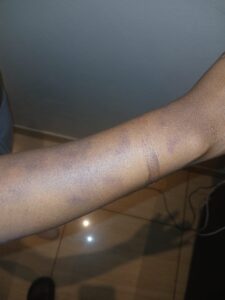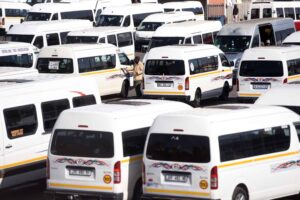By: Magashe Titus Mafolo
First things first! Sport and politics do mix. Russia has been banned from sporting activities because of its war in Ukraine, ‘special operation’ as the Kremlin calls it. Some European teams wear Ukrainian colours, to show their true colours! Yet, in the past, no one had the courage of their convictions to ban USA and England for their invasion of Iraq. Imagine what would have happened!! Some backside baggage would have hit the fan!! But that did not help poor Sepp Blatter. Because truth be told, the USA, being unable to play proper football, have called some funny rugby-like handball game, ‘football’. But realising that the proper football was more popular, they decided to arrest Blatter and charge him with corruption.
Since 1998, France showed the Western countries that to win in the game of soccer, just give citizenship to as many Africans as possible, even if they still retain their native names. But in between major world sporting events, continue with your racist and xenophobic attitudes and actions. Americans remembered that they have been doing that for donkey years in boxing, athletics, baseball, their version of ‘football’ and basketball, where descendants of former slaves bring glory to the land of Stars and Stripes. So, recently, they have emulated France in soccer – the proper football – and enlisted many Africans, including the son of George Weah, to play for them. The elder Weah, the current president of Liberia, saw nothing wrong going all the way to Qatar to cheer Americans, because his son is playing for the imperialists.
We South Africans said: ‘no normal sport in an abnormal society’. But some who were clever than most of us, sent the talented Zola Budd to the 1984 Olympics. To show that she was truly from Africa, she ran barefoot. She then tripped the American Olympic prospect, Mary Decker, with some Americans unfairly accusing her that she was sent to do it deliberately because some rogues in the apartheid system mistook some anti-apartheid demonstrator for Mary Decker.
Apologies for going astray!! Back to Morocco and the fact that some Africans are not celebrating the impressive Moroccan successes at the FIFA World Cup. This may be mistaken for petty jealousy, especially for South Africans whose soccer squad has gone from one of the most talented and glorious teams on the continent to pathetic wimps.
Having played good football and advancing in the FIFA knockout stages in Qatar, the coach and a player of Morocco dedicated their win to the Arab and Muslim people. Only after some backlash from many Africans, did the Moroccan world cup soccer coach and some of their players remembered that their win was also for Africa. But was their initial declared proud dedication of the win to the Arab and Moslems in exclusion of Africa and Africans a Freudian slip or a genuine feeling about their own consciousness and existential reality? The history of Morocco with Africa and its status as a last colonial power over the occupation of the Western Sahara (in violation of the United Nations and the African Union resolutions); her historical collaboration with France in enforcing French neo-colonial grip in Africa all of which had been routinely condemned by many progressive people and governments, points to the reality that, perhaps many in Morocco do not regard themselves as African. They seem to firmly believe that they are an extension of Europe although geographically, ’wrongly’ placed on the African continent. This brief Essay, seeks to present the historical role of Morocco in Africa which makes it difficult for many Africans to celebrate the Moroccan wins at the FIFA Soccer World Cup as ‘African victories’, because, politics and sport mix very well.
BRIEF HISTORICAL BACKGROUND.
Geographically, Morocco has been at the critical meeting points between Europe and Africa.
This was even important during the medieval period. Indeed, age after age, Europe and Europeans lived some primitive, hazy and cramped existences. They could not fathom much beyond their distant mountains or across the terrifying oceans, thus, their dread of the lashing Atlantic waters not far from their homesteads remained very tenacious for long periods. For many years they were trapped within their own backwardness; there was little grand impulse, or motive to venture outside their terrains as was to be the case in later years and for longer periods. Turbulent oceans such as the Atlantic remained, century after century, a realm of fear, fantasy and superstition.
But when they overcame their fearfulness, emerging from that inward-looking and selfabsorbed period, they became unstoppable. They initially survived in envy of the Byzantine and Moorish civilisations that glowed at European eastern and southern edges. But from that time, their imaginations sought wider dimensions. The Portuguese, geographically well positioned to launch Europe’s greatest quest for oceanic dominance, began their Atlantic voyages under Prince Henry the Navigator, even though he was never a sailor. Henry the Navigator, who was to inspire people such as Bartholomew Dias, Vasco da Gama and many others, was said to always wear a ‘hairshirt next to his skin and lived a virtuous and chaste life, without ever knowing a woman or drinking wine or indulging in any vice’.
The Crusaders had helped to restore the extensive Christian navigation on the
Mediterranean after Islam’s long stranglehold. So, from 1460, the Portuguese occupied the greater parts of the Moroccan coast, setting up trading posts along many areas of the northern Atlantic coastline. In no time, their faster oceanic caravels outflanked the slower Islamic terrestrial caravans as they both jostled for West Africa’s rich gold as well as the robust African slaves that they needed after the devastating decimation of their labour by the bubonic Black Death.
Meanwhile, since the spread of Islam into Africa in the 7th century of the Christian era, their followers managed to occupy vast swathes of North Africa, before advancing to both West and East of the continent. Accordingly, with the rise and dominance of European Christians and the advent of colonialism in Africa, Morocco remained firmly an Islamic country.
Up until 1850, Morocco had been relatively successful in keeping the colonial West at bay, with only fewer than 500 Europeans in the country at that time as compared to more than 100 000 in Algeria. Although few Europeans occupied parts of Moroccan territory, by 1912, the French had proclaimed it as a protectorate, with Rabat as a new capital. France and Spain then divided the country into a vast French and Spanish zones. Morocco attained her independence in 1956, when France decided to cling on Algeria amidst one of the most heroic and brutal wars of independence when the Algerian freedom fighters sought to expel the cruel colonial power from their area.
Curiously, for a Morocco that was to be a close collaborator of France in the advancement of the cruel French neo-colonial entrenchment in Africa, for a brief period in the late 1950s and early 1960s, Morocco was indeed a progressive country, being home to radical poets and exiles such as Agostinho Neto. Indeed, after gaining independence from France in 1956 and subsequently from Spain as well as successfully negotiating the inclusion of areas held by Spain by 1975, Morocco had played a positive role in the greater independence of African countries. In 1960, King Mohammed V organised the Casablanca Conference which brought together progressives on the African continent such as Gamal Abdel Nasser of Egypt, Kwame Nkrumah of Ghana, Sekou Toure of Guinea, Modibo Keita of Mali, King Idriss I of Libya and Farhat Abbas of Algeria (Ben Bella of Algeria was in jail). What united the Casablanca Group, as it was known, was a firm belief in the need for African political unification as well as deep integration, including militarily, so as to defeat colonialism and help the continent achieve peace, development and geopolitical influence in global affairs.
Both Abdel Nasser and Kwame Nkrumah in particular were to be the main champions of true African independence and unity, with Nasser easily fusing African and Arabian nationalisms into potent weapons against the West, while Nkrumah became the foremost anti-imperialist leader in Africa until his ousting that was engineered by the CIA. The Casablanca Group also supported the liberation and independence movements that were waging protracted struggles in various African countries.
To counter the influence of the Casablanca Group, the colonial powers discretely encouraged the setting up of the Monrovia Group of the conservatives, which comprised of Liberia, Cameroon, Nigeria, Senegal, Sierra Leone, Togo, Ivory Coast, Somalia and Ethiopia. This Group called for less radical approach to decolonisation through negotiations and sought to oppose the pan-Africanism that came out of the Casablanca Group. For instance, in the Algerian war of independence, the Casablanca Group supported the freedom fighters while some in the Monrovia Group supported France. Later, France formed a Francophone African one called the Brazzaville Group. The fundamental differences between the groups were to be put aside when the Organisation of African Unity (OAU) was formed in 1963 in Ethiopia after the invitation by Emperor Haile Selassie.
The Brazzaville Group was to be tied to the obscene and cruel neo-colonial leash called the
Colonial Pact that is supposed to compensate for French non-existent ‘development’ in Africa. As of 2022, it is estimated that Francophone Africa is forced to transfer over $50billion annually to France through this Colonial Pact rendering French-speaking African countries basket cases. Those who rebel against it get killed such as Thomas Sankara or arrested under trumped-up charges and send to the International Criminal Court (ICC) such as Lauren Gbagbo.
From the middle of the 1970s, Morocco started to play a very destructive role on the African continent, working closely with France. It provided well-trained military security for corrupt African countries that were under the tutelage, especially of France. This happened in countries such as Gabon, Togo and other French-speaking African countries. Further, during the Shaba rebellion of 1977 in the Katanga province of the DRC, at the time of the kleptocratic rule of Mobutu Seso Seko, Morocco sent troops to protect the Mobutu regime and secure Western interests. They worked with Belgian and French para-troopers to commit some horrific acts of violence. Angola, Cuba, East Germany and the Soviet Union supported the Congolese who wanted to bring to an end the neo-colonial regime and imperialist hold on their country. The following year, in 1978, the Katanga province rose up again against Mobutu and Morocco, France, USA and Belgium came to his rescue. In both rebellions, soldiers from France, Morocco, Belgium and the USA not only killed many civilians, but there were widespread cases of rape of women by these mercenary forces.
In 1984, Morocco left the Organisation of African Unity (OAU) because of its refusal to accede to the self-determination of the Saharan Arab Democratic Republic – Western Sahara. Western Sahara, formerly a Spanish colony has been occupied by Morocco with annexations taking place in 1976 and 1979, acts considered illegal under international law. UN regards Western Sahara as a non-decolonised territory and is included in the United Nations list of non-self-governing territories. Under international law, Western Sahara is not a legal part of Morocco and it remains under the international law of military occupation.
In 1987, Morocco applied to join the European Communities (the precursor to the European Union). This demonstrates the confused and split personality of Morocco – a country, geographically situated in Africa but which sees itself as European. The application was rejected on the grounds that Morocco was not considered to be a ‘European country’. However, Morocco tops the list of partners that benefit from European Union’s financial support as part of ‘neighbourhood assistance’. Bilateral relations with the EU have increased substantially since the period 2011-2013 and the EU is the largest trading partner of Morocco. For many years now, there have been billions of dollars of loans and other financial assistance measures to Morocco from the EU and thus helping in social, manufacturing and economic infrastructure as well as in the private sector, vocational training and civil society. Politically, even though the EU rejected Morocco’s application for membership, the country was granted what is called advanced status, which ensures among others, regular consultation mechanisms at ministerial level and integration of the single market.
The illegal Moroccan claim to Western Sahara is fully supported by the United States of
America and while France claims neutrality, it supports Morocco militarily in its war with the Western Sahara liberation movement, Polisario. However, in the last two decades, Morocco, assisted to large degrees by France, has registered a number of diplomatic victories both internationally and on the African continent. In 2017, Morocco managed to join the African Union (AU) after a tense and emotional debate that pitted countries such as Algeria, South Africa, Namibia, Mozambique, Angola, Tanzania and Zimbabwe, on the one hand, against the majority of African countries that argued for the acceptance of Morocco into the AU. This is despite Morocco still illegally occupying Western Sahara in flagrant disregard of both the UN and AU resolutions. 39 African countries out 54 voted to admit Morocco into the AU. Before the AU vote, Morocco had embarked on an aggressive dollar-diplomacy – among others, agreeing to build a $3.5 billion fertiliser in Ethiopia, a gas pipeline in Nigeria to Europe and other investments in different African countries.
Morocco has also used the belief that King Mohammed VI, their present monarch, who belongs to the Alaouite dynasty, is related to Prophet Muhammed, founder of the Islamic faith. This family relationship is traced through Prophet Muhammed’s daughter, Fatimah azZahran and her husband Ali ibn Abi Talib. Accordingly, this has boosted the relationship with conservative Moslems in Africa some of whom are in influential government positions. Further, Morocco’s close ties with France, which have a strong neo-colonial hold on most of Francophone-African countries, has been beneficial in its diplomatic forays. Importantly, one of the critical reasons for Morocco’s success in Africa is the absence or decline of strong pan-African leadership that was present for long periods, including when the OAU was transformed into the AU in 2002.
In short, for many years, Morocco has displayed some imperial tendencies towards Africa. Morocco has also participated in the strengthening of neo-colonialism in Africa, working with France. And unfortunately, contrary to any diplomatic posturing, Morocco has seen itself as part of Europe, hence its application to join the European Community. In reality, Morocco turned to Africa after being unsuccessful in its quest to join the European Union. Today, when they win soccer matches at the world cup, the first instinctive feeling that comes, is of being Arab and Muslim at the exclusion of Africa. On the other hand, because of their history and affinity with their mother-continent, the Algerians and other patriotic African Arabs would have immediately acknowledged their Africaness, because they have been part of the titanic struggles of Africa’s freedom and independence.
So, do we celebrate Morocco given all this history? In the absence, in the FIFA World Cup, of other Africans countries which, notwithstanding the trials and tribulations imposed on us, are still proud Africans – from Algeria and other North African countries, West Africa, East and Central Africa and Southern Africa, some of us support the South American countries. And between France and Morocco?? Since the two have a patron-client relationship on the entrenchment of neo-colonialism in Africa, maybe the client, which is a subservient partner must punish the patron, until the patron – France – brings back the billions of dollars it is taking out of Africa and repatriate the skilful African players that are sweating for the colonial master to come and play for their respective African countries. So, as I said at the beginning: Sport and politics do mix!
—————————————————
REFERENCES:
- Oliver, R. The African Experience, 1991
- Hochschild, S. King Leopald’s Ghost, 1998
- Cameron, LV, Across Africa, 1877
- Meredith, M. The State of Africa, 2005
- Saunders, AC de CM; A Social History of the Black Slaves and Freemen in Portugal 1441-1555, 1982.
- Reader, John, Africa – A Biography of the Continent,1997
- Mostert, Joel, Frontiers, 1992
- Pakenham, Thomas, The Scramble for Africa, 1991.
- McNeill, WH, A World History, 1979.
- Mafolo, MT, African Odyssey Volume 3, 2020
- Somerville, K, Africa’s Long History Since Independence, 2017
https://issaafrica.org/iss–today Institute for Security Studie







